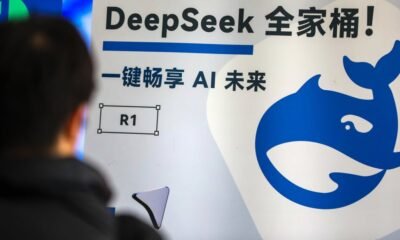Tools & Platforms
China urges consensus on AI development

SHANGHAI:
China’s Premier Li Qiang warned Saturday that artificial intelligence development must be weighed against the security risks, saying global consensus was urgently needed even as the tech race between Beijing and Washington shows no sign of abating.
His remarks came just days after US President Donald Trump unveiled an aggressive low-regulation strategy aimed at cementing US dominance in the fast-moving field, promising to “remove red tape and onerous regulation” that could hinder private sector AI development.
Opening the World AI Conference (WAIC) in Shanghai on Saturday, Li emphasised the need for governance and open-source development, announcing the establishment of a Chinese-led body for international AI cooperation.
“The risks and challenges brought by artificial intelligence have drawn widespread attention… How to find a balance between development and security urgently requires further consensus from the entire society,” the premier said.
He gave no further details about the newly announced organisation, though state media later reported “the preliminary consideration” was that it would be headquartered in Shanghai.
The organisation would “promote global governance featuring extensive consultation, joint contribution and shared benefits”, state news agency Xinhua reported, without elaborating on its set-up or mechanisms.
At a time when AI is being integrated across virtually all industries, its uses have raised major questions, including about the spread of misinformation, its impact on employment and the potential loss of technological control.
In a speech at WAIC on Saturday, Nobel Prize-winning physicist Geoffrey Hinton compared the situation to keeping “a very cute tiger cub as a pet”.
To survive, he said, you need to ensure you can train it not to kill you when it grows up.
The enormous strides AI technology has made in recent years have seen it move to the forefront of the US-China rivalry.
Premier Li said China would “actively promote” the development of open-source AI, adding Beijing was willing to share advances with other countries, particularly developing ones.
“If we engage in technological monopolies, controls and blockage, artificial intelligence will become the preserve of a few countries and a few enterprises,” he said.
Vice Foreign Minister Ma Zhaoxu warned against “unilateralism and protectionism” at a later meeting.
Washington has expanded its efforts in recent years to curb exports of state-of-the-art chips to China, concerned that they can be used to advance Beijing’s military systems and erode US tech dominance.
Li, in his speech, highlighted “insufficient supply of computing power and chips” as a bottleneck to AI progress.
Tools & Platforms
OpenAI Unveils Jobs Platform, Certification Program to Match Workers With AI-Era Employment

- OpenAI is launching the OpenAI Jobs Platform, a marketplace designed to connect AI-skilled workers with employers, as part of its effort to address workforce disruption and create new opportunities as AI adoption accelerates.
- The platform will feature candidates across expertise levels and support hiring for large companies, small businesses, and governments, with early partners including the Texas Association of Business, Walmart, John Deere, BCG, Accenture, Indeed, and state governments.
- Complementing the platform, OpenAI will expand its Academy with new certification programs available directly in ChatGPT, aiming to certify 10 million Americans by 2030, positioning AI fluency as a critical workforce credential.
OpenAI is rolling out a jobs platform and certification program designed to connect AI-skilled workers with employers, part of a broader push to address workplace disruption as artificial intelligence spreads across industries, CEO of Applications Fidji Simo announced in a blog post.
The OpenAI Jobs Platform will serve as a marketplace for businesses seeking employees fluent in AI tools and for workers looking to apply those skills. The platform, which will feature candidates at multiple levels of expertise, is intended to streamline hiring for large companies, local businesses, and government agencies. Groups including the Texas Association of Business plan to use the system to link thousands of employers with AI-trained talent, according to Simo.
Other partners include John Deere, Boston Consulting Group, Accenture, Indeed, and several state governments, the company said.
The move comes as employers increasingly cite AI expertise as a critical requirement for future competitiveness. OpenAI said it will complement the platform with a certification program to validate workers’ AI skills. The certifications build on the company’s OpenAI Academy, a free online training hub launched earlier this year that has already drawn more than two million participants. The expanded program will allow users to prepare for and earn certifications directly in ChatGPT, from basic AI fluency to advanced prompt engineering.
The company aims to certify 10 million Americans by 2030. Walmart, the world’s largest private employer, is among the first partners, the company pointed out.
“At Walmart, we know the future of retail won’t be defined by technology alone—it will be defined by people who know how to use it,” John Furner, CEO, Walmart U.S., said in a statement. “By bringing AI training directly to our associates, we’re putting the most powerful technology of our time in their hands—giving them the skills to rewrite the playbook and shape the future of retail.”
OpenAI indicated its initiatives highlight the dual nature of AI’s economic impact: the technology is expected to generate new opportunities while disrupting traditional roles. Jobs will look different, companies will have to adapt, and all of us—from shift workers to CEOs—will have to learn how to work in new ways,” Simo wrote.
She pointed out the launch aligns with the White House’s AI literacy campaign and as they move forward, the initiatives will focus on the needs of employees and employers.
“It’s all about being intentional about the kind of future we want to build,” Simo wrote. “If we want to put more power into the hands of more people, not just a fortunate few, we need to help everyone, at every level, take advantage of the opportunities that come with AI. We’ve still got a long way to go, but this is an important step in the right direction.”
Tools & Platforms
OpenAI Unveils Jobs Platform, Certification Program to Match Workers With AI-Era Employment

- OpenAI is launching the OpenAI Jobs Platform, a marketplace designed to connect AI-skilled workers with employers, as part of its effort to address workforce disruption and create new opportunities as AI adoption accelerates.
- The platform will feature candidates across expertise levels and support hiring for large companies, small businesses, and governments, with early partners including the Texas Association of Business, Walmart, John Deere, BCG, Accenture, Indeed, and state governments.
- Complementing the platform, OpenAI will expand its Academy with new certification programs available directly in ChatGPT, aiming to certify 10 million Americans by 2030, positioning AI fluency as a critical workforce credential.
OpenAI is rolling out a jobs platform and certification program designed to connect AI-skilled workers with employers, part of a broader push to address workplace disruption as artificial intelligence spreads across industries, CEO of Applications Fidji Simo announced in a blog post.
The OpenAI Jobs Platform will serve as a marketplace for businesses seeking employees fluent in AI tools and for workers looking to apply those skills. The platform, which will feature candidates at multiple levels of expertise, is intended to streamline hiring for large companies, local businesses, and government agencies. Groups including the Texas Association of Business plan to use the system to link thousands of employers with AI-trained talent, according to Simo.
Other partners include John Deere, Boston Consulting Group, Accenture, Indeed, and several state governments, the company said.
The move comes as employers increasingly cite AI expertise as a critical requirement for future competitiveness. OpenAI said it will complement the platform with a certification program to validate workers’ AI skills. The certifications build on the company’s OpenAI Academy, a free online training hub launched earlier this year that has already drawn more than two million participants. The expanded program will allow users to prepare for and earn certifications directly in ChatGPT, from basic AI fluency to advanced prompt engineering.
The company aims to certify 10 million Americans by 2030. Walmart, the world’s largest private employer, is among the first partners, the company pointed out.
“At Walmart, we know the future of retail won’t be defined by technology alone—it will be defined by people who know how to use it,” John Furner, CEO, Walmart U.S., said in a statement. “By bringing AI training directly to our associates, we’re putting the most powerful technology of our time in their hands—giving them the skills to rewrite the playbook and shape the future of retail.”
OpenAI indicated its initiatives highlight the dual nature of AI’s economic impact: the technology is expected to generate new opportunities while disrupting traditional roles. Jobs will look different, companies will have to adapt, and all of us—from shift workers to CEOs—will have to learn how to work in new ways,” Simo wrote.
She pointed out the launch aligns with the White House’s AI literacy campaign and as they move forward, the initiatives will focus on the needs of employees and employers.
“It’s all about being intentional about the kind of future we want to build,” Simo wrote. “If we want to put more power into the hands of more people, not just a fortunate few, we need to help everyone, at every level, take advantage of the opportunities that come with AI. We’ve still got a long way to go, but this is an important step in the right direction.”
Tools & Platforms
Geoffrey Hinton Warns AI Will Boost Productivity But Widen Inequality

Hinton’s Stark Warning on AI’s Economic Divide
Nobel laureate Geoffrey Hinton, often dubbed the “godfather of AI,” has issued a sobering prediction about the technology’s potential to exacerbate wealth inequality. In a recent interview, Hinton argued that artificial intelligence could dramatically boost productivity but funnel the resulting gains to a tiny elite, leaving the majority of workers economically stranded. This perspective comes amid growing concerns in the tech industry about AI’s disruptive force on labor markets.
Drawing from his decades of pioneering work in neural networks, Hinton likened AI’s impact to the Industrial Revolution, which rendered human physical strength obsolete. Now, he warns, AI threatens to do the same to human intelligence, automating jobs across sectors from customer service to creative fields. The result, he suggests, could be widespread unemployment without corresponding wealth redistribution.
The Productivity Paradox and Elite Enrichment
Hinton’s comments, detailed in an article by the Financial Times, highlight how AI-driven efficiencies might primarily benefit shareholders and executives. He points to examples like tech CEOs slashing workforces by thousands after implementing AI systems that handle tasks such as customer inquiries with unprecedented speed and accuracy. This shift, Hinton contends, concentrates wealth upward, widening the gap between the haves and have-nots.
Industry insiders are already witnessing this dynamic play out. Reports from sources like Slashdot echo Hinton’s fears, noting that AI’s ability to replace human labor could impoverish most workers while enriching a select few. Hinton advocates for policy interventions, such as universal basic income (UBI), to mitigate these effects, a stance he reiterated in discussions with the BBC.
Calls for Universal Basic Income as a Safeguard
In prior statements covered by the BBC, Hinton emphasized that governments must step in with UBI to address AI-induced job losses. He argues that without such measures, the surge in productivity will not trickle down, potentially fostering social unrest or even fascist tendencies as economic disparities grow. This view aligns with broader debates in tech circles about ethical AI development.
Hinton’s evolution on these issues is notable. As reported in the MIT Technology Review, he once downplayed AI’s risks but now expresses alarm over its potential to outstrip human intelligence, leading to existential threats. For industry leaders, this means grappling with not just technological advancement but its societal ripple effects.
Broader Implications for the Tech Sector
The warnings extend beyond economics to AI’s governance. Hinton proposes that AI companies allocate a third of their computing resources to safety research, as discussed in posts on X and covered by outlets like Free Press Journal. He believes this is crucial as AI systems grow smarter, possibly within the next two decades, outpacing human capabilities in unpredictable ways.
Critics in the industry argue that Hinton’s pessimism overlooks AI’s potential to create new jobs in fields like data ethics or AI maintenance. Yet, his track record—having pioneered foundational AI technologies—lends weight to his concerns. As one MIT Sloan analysis notes, Hinton’s shift underscores the “existential dangers” of unchecked AI progress.
Pathways to Equitable AI Development
To counter these risks, Hinton urges a reevaluation of how AI wealth is distributed. He suggests embedding safeguards, such as “maternal instincts” in AI to prioritize human safety, an idea explored in reports from Fox Business. This could involve regulatory frameworks that ensure AI benefits society broadly, not just corporate bottom lines.
For tech insiders, Hinton’s message is a call to action: innovate responsibly or risk amplifying inequality. As AI reshapes economies, balancing progress with equity will define the industry’s legacy. His insights, drawn from a career at the forefront of AI, serve as a crucial reminder that technology’s promise must be matched by proactive societal measures to prevent a divided future.
-

 Business1 week ago
Business1 week agoThe Guardian view on Trump and the Fed: independence is no substitute for accountability | Editorial
-
Tools & Platforms3 weeks ago
Building Trust in Military AI Starts with Opening the Black Box – War on the Rocks
-

 Ethics & Policy1 month ago
Ethics & Policy1 month agoSDAIA Supports Saudi Arabia’s Leadership in Shaping Global AI Ethics, Policy, and Research – وكالة الأنباء السعودية
-

 Events & Conferences4 months ago
Events & Conferences4 months agoJourney to 1000 models: Scaling Instagram’s recommendation system
-

 Jobs & Careers2 months ago
Jobs & Careers2 months agoMumbai-based Perplexity Alternative Has 60k+ Users Without Funding
-

 Education2 months ago
Education2 months agoVEX Robotics launches AI-powered classroom robotics system
-

 Funding & Business2 months ago
Funding & Business2 months agoKayak and Expedia race to build AI travel agents that turn social posts into itineraries
-

 Podcasts & Talks2 months ago
Podcasts & Talks2 months agoHappy 4th of July! 🎆 Made with Veo 3 in Gemini
-

 Podcasts & Talks2 months ago
Podcasts & Talks2 months agoOpenAI 🤝 @teamganassi
-

 Education2 months ago
Education2 months agoMacron says UK and France have duty to tackle illegal migration ‘with humanity, solidarity and firmness’ – UK politics live | Politics





















